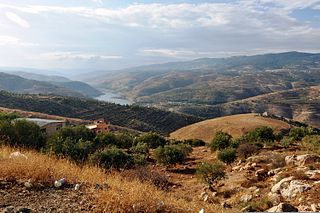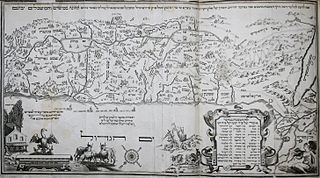Related Research Articles

Abarim is the Hebrew name used in the Bible for a mountain range "across the Jordan", understood as east of the Jordan Rift Valley, i.e. in Transjordan, to the east and south-east of the Dead Sea, extending from Mount Nebo — its highest point — in the north, perhaps to the Arabian desert in the south.
Abiezer or Abieezer is the name of three Biblical characters. The name means "father of help" i.e., helpful. The characters are:
Abihail may refer to one of five different people mentioned in the Bible:
Abiram, also spelled Abiron, is the name of two people in the Old Testament. One was a member of the Tribe of Reuben, the son of Eliab, who, along with his brother Dathan, joined Korah in the conspiracy against Moses and Aaron. He and all the conspirators, with their families and possessions, were swallowed up by the ground.
Ahihud is the name of two biblical figures. In English, both figures are called "Ahihud," which represents two different names in Hebrew.
Ahijah is a name of several biblical individuals:
- Ahijah the Shilonite, the Biblical prophet who divided the Kingdoms of Israel and Judah.
- One of the sons of Bela. In AV (KJV) called "Ahiah."
- One of the five sons of Jerahmeel, who was great-grandson of Judah.
- A Pelonite, one of David's heroes ; called also Eliam.
- A Levite having charge of the sacred treasury in the temple.
- One of Solomon's secretaries.
- Son of Ahitub, Ichabod's brother; the same probably as Ahimelech, who was High Priest at Nob in the reign of Saul and at Shiloh, where the Tabernacle was set up. Some, however, suppose that Ahimelech was the brother of Ahijah, and that they both officiated as high priests, Ahijah at Gibeah or Kirjath-jearim, and Ahimelech at Nob.
- Father of King Baasha of Israel

In the Hebrew Bible, Oholiab, son of Ahisamakh, of the tribe of Dan, worked under Bezalel as the deputy architect of the Tabernacle and the implements which it housed, including the Ark of the Covenant. He is described in Exodus 38:23 as a master of carpentry, weaving, and embroidery.
The name Ammiel may refer to several people in the Hebrew Bible. Etymologically, it means "people of God", and is used for the following individuals:
In the Book of Numbers, Ammishaddai was the father of Ahiezer, who was chief of the Tribe of Dan at the time of the Exodus.

Joab the son of Zeruiah, was the nephew of King David and the commander of his army, according to the Hebrew Bible.

Ephraim was, according to the Book of Genesis, the second son of Joseph ben Jacob and Asenath. Asenath was an Ancient Egyptian woman whom Pharaoh gave to Joseph as wife, and the daughter of Potipherah, a priest of ʾĀwen. Ephraim was born in Egypt before the arrival of the Israelites from Canaan.

Gilead or Gilad is the ancient, historic, biblical name of the mountainous northern part of the region of Transjordan. The region is bounded in the west by the Jordan River, in the north by the deep ravine of the river Yarmouk and the region of Bashan, and in the southwest by what were known during antiquity as the “plains of Moab”, with no definite boundary to the east. In some cases, “Gilead” is used in the Bible to refer to all the region east of the Jordan River. Gilead is situated in modern-day Jordan, corresponding roughly to the Irbid, Ajloun, Jerash and Balqa Governorates.
Abidan, son of Gideoni, was a judge, head of the tribe of Benjamin and one of the leaders of the tribes of Israel at the time of the Exodus. His name means father of judgment or My fatherhas judged.

According to the Hebrew Bible, Phinehas or Phineas was a priest during the Israelites’ Exodus journey. The grandson of Aaron and son of Eleazar, the High Priests, he distinguished himself as a youth at Shittim with his zeal against the heresy of Peor.
Jeroham is a name which means "cherished" or "one who finds mercy". A number of people with this name are mentioned in the Hebrew Bible:
- The Father of Elkanah, and grandfather of the prophet Samuel — in 1 Samuel 1:1.
- The father of Azareel, the "captain" of the tribe of Dan — in 1 Chronicles 27:22.
- A Benjamite mentioned in 1 Chronicles 12:7 and 1 Chronicles 9:12.
- The father of Azariah, one of the "commanders of the hundreds" who formed part of Jehoiada's campaign to restore the kingship to Joash in 2 Chronicles 23:1
- A priest mentioned in 1 Chronicles 9:12;.

Manasseh or Menashe was, according to the Book of Genesis, the first son of Joseph and Asenath. Asenath was an Egyptian woman whom the Pharaoh gave to Joseph as wife, and the daughter of Potipherah, a priest of On. Manasseh was born in Egypt before the arrival of the children of Israel from Canaan.

According to the Hebrew Bible, the Tribe of Reuben was one of the twelve tribes of Israel. Unlike the majority of the tribes, the land of Reuben, along with that of Gad and half of Manasseh, was on the eastern side of the Jordan and shared a border with Moab. According to the biblical narrative, the Tribe of Reuben descended from Reuben, the eldest son of the patriarch Jacob. Reuben, along with nine other tribes, is reckoned by the Bible as part of the northern kingdom of Israel, and disappears from history with the demise of that kingdom in c. 723 BC.

According to the Hebrew Bible, the Tribe of Zebulun was one of the twelve tribes of Israel.
References
![]() This article incorporates text from a publication now in the public domain : Easton, Matthew George (1897). "Ammihud". Easton's Bible Dictionary (New and revised ed.). T. Nelson and Sons.
This article incorporates text from a publication now in the public domain : Easton, Matthew George (1897). "Ammihud". Easton's Bible Dictionary (New and revised ed.). T. Nelson and Sons.